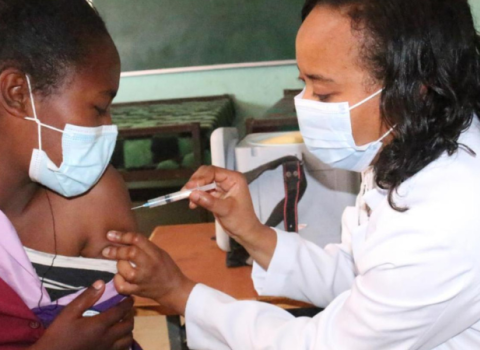
Breast
cancer cell. Picture courtesy US National Cancer Institute
Research aiming to improve surgery, pathology and diagnostic and staging imaging, as well as a radical rethink of the approach to prevention research, must become the focus of public funded cancer research now. Worldwide, the public sector spent €14 billion on cancer research 2004/05, the latest year for which figures are available.
“An analysis we have just completed shows that, on average, European public funders are spending 74 per cent of their money on fundamental biology and drug development research and that well over 70 per cent of the cancer research initiatives at the European level are aimed at the same areas,” said Sullivan.
Imbalance
In the US, the imbalance is even greater, even though there is no shortage of cancer drugs coming through pipeline, and the whole area of drug research is quite healthy. “What we need is a reapportioning of budgets from the charitable sector and public funders to carve out space for these other areas of cancer research that are largely invisible to a lot of policymakers,” said Sullivan, who is also chairman of the European Cancer Research Managers Forum, which studies cancer research and funding in Europe.
“This is a deeply unfashionable view and the easy way out is to say that we must just ask for more money, but the reality is that we’ve got to prioritise,”Sullivan said.
“Most of the new medicines are having a small impact on the big picture of cancer burden at the moment, extending life by a few months. Research in this area is already heavily funded and that will continue regardless, as will the investments in fundamental cancer biology.”
Detecting cancer early enough to treat it successfully and improving understanding of how to make primary prevention strategies work hold the potential for the greatest gains. “This demands an overhaul of prevention research. You can take the quite reasonable view that we know the risk factors now. What we don’t understand is how to take that research on prevention and apply it in populations because we don’t understand the behaviour of those groups, or how that might change over the next 20 or 30 years.
Cancer researchers must now be more imaginative and collaborate across unusual disciplinary boundaries to embrace behavioural engineering, population psychology, evolutionary biology, novel sociological methods and ideas such as cultural transmission theory, the study of how behaviours are learned and transmitted between generations, said Sullivan.
“Research in these novel areas addresses questions that can never be answered with classical epidemiological studies or standard social science questionnaires – we’ve reached the limits of enquiry with many standard approaches. There are people doing fantastic work that could be extremely useful not only to cancer research, but to medicine in general and most medics and researchers are completely ignorant about their existence and what they can do for medicine.”





 A unique international forum for public research organisations and companies to connect their external engagement with strategic interests around their R&D system.
A unique international forum for public research organisations and companies to connect their external engagement with strategic interests around their R&D system.